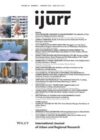The 1996 welfare reform act devolved authority over ‘workfare’ to the states and allowed them to further devolve control to local and regional entities, yet little is known about how such ‘second‐order’ devolution affected implementation and outcomes. This article applies urban regime theory and the comparative case study method to analyze the impacts of the ‘paradigmatically neoliberal’ model of second‐order devolution implemented in Texas. Pursuing a labor market‐based approach, Texas devolved authority for workfare to regional — i.e. multi‐county — Workforce Investment Boards (WIBs) directed, in theory, by private sector employers. The findings indicate, however, that the WIBs functioned as patronage‐oriented ‘employment regimes’ dominated by local elected officials and ‘machine‐politics community based organizations’. The outcome was a socially and spatially regressive transfer of federal resources from needy families in the most distressed counties to regime actors and organizations in more politically‐institutionally powerful counties. This left families in the politically weak case study counties subject to the state’s diversionary ‘workfirst’ program without access to crucially necessary childcare and transportation assistance. The study extends our understanding of how neoliberal workfare exacerbates inequality at the sub‐state level through a regionally constituted form of political‐institutional exclusion.
Details
Written by:
Mark H. Harvey
Digital Object Identifier (DOI)
10.1111/j.1468-2427.2012.01148.x
About DOI
Read full article as PDF
Read full article as HTML
See the references for this article
